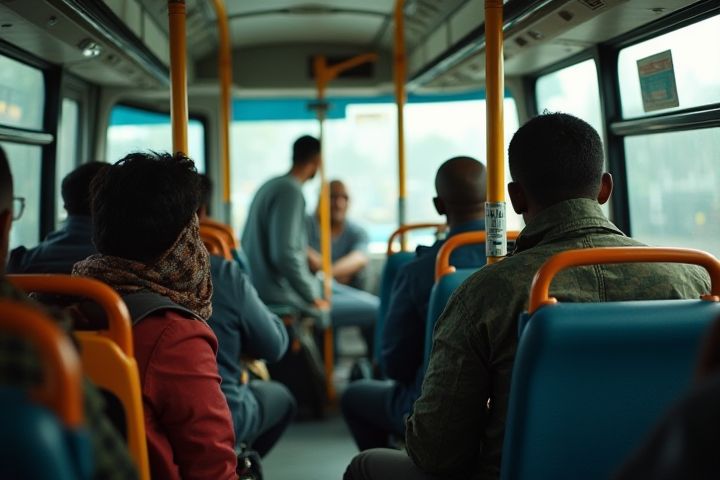
Nigeria's public transportation system is diverse, encompassing buses, tricycles, and motorcycles, often referred to as "okadas" and "keke napeps." Major cities such as Lagos and Abuja have mass transit options, including the Bus Rapid Transit (BRT) system, which enhances commute efficiency. However, challenges such as traffic congestion and safety concerns persist, impacting the daily travel experience. Various private companies also operate ride-hailing services, providing users with more convenience and flexibility. If you're navigating through Nigeria, understanding local transportation options can significantly improve your journey.
Diverse Modes: Buses, motorcycles, tricycles
Public transportation in Nigeria encompasses a variety of diverse modes, including buses, motorcycles, and tricycles, each offering unique advantages for commuters. Buses operate on established routes, providing affordable and reliable service in urban areas, while motorcycles, often referred to as "okadas," offer flexibility and quick access through congested traffic. Tricycles, commonly known as "kekes," serve as an efficient option for short-distance travel, bridging gaps in the public transport network. Understanding these transportation modes can help you navigate Nigeria's bustling cities effectively.
BRT in Lagos: Rapid Transit System
The Bus Rapid Transit (BRT) system in Lagos, Nigeria, revolutionizes public transportation by offering efficient and dedicated bus lanes that significantly reduce travel time. This system provides affordable and reliable transit options for millions of commuters, helping to alleviate the chronic traffic congestion in the city. BRT stations are strategically located to enhance accessibility and maximize ridership, ensuring that more individuals can benefit from this effective mode of transport. With a focus on sustainability, the BRT network contributes to reduced carbon emissions, promoting a cleaner urban environment.
Danfo: Popular yellow minibuses
Danfo, the iconic yellow minibuses of Nigeria, serve as a vital mode of public transportation in urban areas, particularly in Lagos. These vehicles, typically operated by private entrepreneurs, are known for their affordability and accessibility, catering to millions of commuters daily. With a seating capacity of up to 14 passengers, Danfo minibuses are often characterized by their lively atmosphere and vibrant cultural significance, featuring local music and interactions among riders. As a result, riding a Danfo not only provides an efficient means of travel but also immerses you in the dynamic hustle and bustle of Nigerian city life.
Okadas: Motorcycle taxis
In Nigeria, public transportation heavily relies on Okadas, which are motorcycle taxis offering an affordable and flexible means of travel in densely populated urban areas. These two-wheeled vehicles navigate through traffic congestion, providing quicker commutes for passengers seeking to reach their destinations efficiently. The rise of motorcycle taxis has led to increased livelihood opportunities for many drivers, while also contributing to the overall informal economy. However, safety concerns and regulatory challenges surrounding Okadas continue to spark debates among policymakers and communities alike.
Keke Napep: Motorized tricycles
Keke Napep, a popular mode of public transportation in Nigeria, consists of motorized tricycles that offer an efficient and affordable means of travel. These vehicles are particularly prevalent in urban areas, providing a crucial link for commuters navigating congested streets. With a capacity to seat three passengers comfortably, Keke Napep serves as a vital alternative to overcrowded buses and taxis, enhancing mobility for those seeking swift transportation. You can find these colorful tricycles operating in various cities, reflecting the vibrant culture and bustling lifestyle of Nigerian society.
Traffic Congestion: Major urban challenge
Traffic congestion in Nigeria's major urban centers, such as Lagos and Abuja, presents a significant challenge for public transportation systems. Buses, taxis, and ride-sharing services often struggle to navigate overcrowded roads, leading to longer commute times and increased pollution levels. The integration of smart traffic management systems and dedicated bus lanes could enhance efficiency and reduce congestion. You can support local initiatives aimed at improving public transit infrastructure to make commuting a smoother experience for everyone.
Road Safety: Evolving regulations
In Nigeria, public transportation is undergoing significant evolution with a strong emphasis on road safety regulations. Recent initiatives aim to enhance the enforcement of safety standards for commercial vehicles, including routine checks for roadworthiness and driver training programs. The introduction of monitoring technologies, such as GPS tracking, allows authorities to ensure compliance with speed limits and reduce reckless driving incidents. As a passenger, you benefit from these improved safety measures, fostering a safer commuting environment across the nation's road network.
Ticketing System: Cash and electronic options
Nigeria's public transportation system incorporates a dual ticketing approach, offering both cash and electronic payment options for commuters. Cash transactions remain prevalent, particularly among those in rural areas where digital access may be limited. Conversely, urban centers are witnessing a surge in the adoption of electronic ticketing systems, which facilitate faster transactions and enhance accessibility through mobile apps. By streamlining the ticketing process, these systems aim to improve the overall efficiency of public transport and cater to the diverse needs of passengers across the nation.
Intercity Connections: Buses and trains
In Nigeria, public transportation relies heavily on intercity connections, primarily through a network of buses and trains. Long-distance buses, operated by various companies, offer affordable travel options between major cities, such as Lagos, Abuja, and Port Harcourt, while ensuring regular schedules for commuters. The railway system, though limited, is undergoing expansion and modernization to improve connectivity and reliability, with routes linking key urban centers and providing a faster alternative for travelers. For your journeys across the country, exploring both bus and train options can enhance your travel experience and accessibility.
Infrastructure Development: Ongoing projects
Nigeria's public transportation sector is experiencing significant infrastructure development aimed at enhancing connectivity and efficiency. Key ongoing projects include the Lagos Rail Mass Transit, which seeks to alleviate traffic congestion and provide a reliable transit option for millions. In Abuja, the Federal Capital Territory is expanding its BRT system to improve the accessibility of various neighborhoods. You can also observe an increase in investment towards the modernization of bus terminals and the introduction of smart ticketing systems, all designed to create a seamless travel experience for users.
